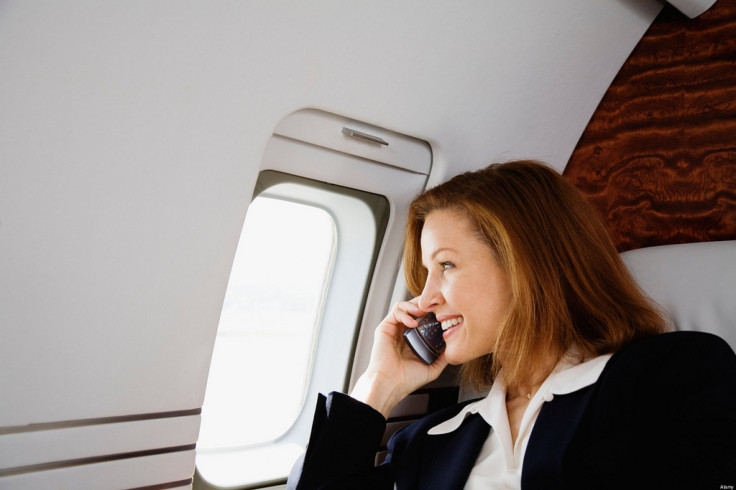FCC vs. DOT: The Noisy Conversation Over In-Flight Phone Calls

Though nearly two-dozen airlines in Latin America, Europe, Asia and the Middle East already let fliers make a call at 35,000 feet, the battle over whether or not to allow similar policies in U.S. skies is shaping up to be a long and contentious one.
The Federal Communications Commission (FCC) voted 3 to 2 on Thursday to start a months-long public comment process on a proposal that would lift the ban on in-flight phone calls onboard all U.S. carriers. But no sooner had the FCC made its announcement than the Department of Transportation (DOT) countered that it was considering a new ban of its own to keep calls off flights.
"Over the past few weeks, we have heard of concerns raised by airlines, travelers, flight attendants, members of Congress and others who are all troubled over the idea of passengers talking on cell phones in flight -- and I am concerned about this possibility as well," Transportation Secretary Anthony Foxx said in a statement. "As the FCC has said before, their sole role on this issue is to examine the technical feasibility of the use of mobile devices in flight … DOT will now begin a process that will look at the possibility of banning these in-flight calls."
Meanwhile, FCC Chairman Thomas Wheeler called Thursday’s proposal “pro-free market, pro-competition, pro-technology and deregulatory,” adding that the proposed policy change had garnered a lot of attention but was widely misunderstood.
“Let me say up front that I get it. I don’t want the person in the seat next to me yapping at 35,000 feet any more than anyone else,” Wheeler told those at an oversight hearing at the House of Representatives Thursday. “We simply propose that because new technology makes the old rule obsolete the FCC should get government out from between airlines and their passengers. Where there is not a need for regulation, the free market works best to determine the appropriate outcome.”
Even if FCC did change its rule, airlines would not be required to allow in-flight phone calls, nor would they need to install an on-board access system that would let consumers use their existing mobile devices (as opposed to signing up for Wi-Fi).
“The airline would be in total control of what types of mobile services to permit,” Wheeler continued. “A mobile device can send texts and emails, and can surf the Web. A mobile device can also make a voice call. The technology allows for the differentiation among such services. Thus, airlines would be free to make their own determination whether to program the new equipment to block voice calls while permitting texting, email and Web surfing, consistent with the rules of the authorities on aviation safety.”
The new FCC proposal comes just weeks after the Federal Aviation Administration lifted a ban on the use of personal electronic devices below 10,000 feet. But questions remain over the social implications of letting passengers chatter on the plane.
Roger Dow, CEO of the U.S. Travel Association, said the broader travel community remained skeptical of a change. “A policy change of this nature should only be made after exhaustively contemplating whether it improves the travel experience, and there are some strong indications that travelers themselves do not want it,” he said. “The travel community urges the FCC to be as thorough as possible in seeking data for its consideration of this policy move, as the FAA was in revisiting its policy on the use of electronic devices in-flight.”
Henry H. Harteveldt, travel industry analyst at Hudson Crossing, LLC, said he was surprised that the FCC took up the issue in the first place given that there is “no commercial demand, no demand from passengers and no demand from airlines.”
“The last thing you need is to have your blood pressure raging on a crowded flight thanks to someone next to you jabbering on endlessly, be it for business or personal reasons,” he said. “This could contribute to an increase in air rage in passengers. I’m also concerned that someone talking on their cell during takeoff or landing -- when most accidents occur -- could compromise the ability of passengers to hear important safety information from the cabin crew.”
Harteveldt noted that the initial reaction to the FCC proposal had been quite negative, which indicates that if an airline does implement in-flight mobile broadband, they could risk loosing more passengers than they’d gain. Airlines, he said, would also have to install more equipment, which would make the planes heavier and increase fuel consumption.
Flight Attendant unions vowed to fight the FCC plan and began an extensive public and congressional outreach campaign Thursday.
“As first responders in the aircraft cabin, flight attendants know that this reckless FCC proposal would have negative effects on aviation safety and security,” said Veda Shook, president of the Association of Flight Attendants International. “In far too many operational scenarios, passengers making phone calls could extend beyond a mere nuisance, creating risks that are far too great. As the last line of defense in our nation’s aviation system, flight attendants understand the importance of maintaining a calm cabin environment, and passengers agree.”
A Quinnipiac University poll released Thursday found that 59 percent of Americans opposed the use of cell phones for calls on airlines, while just 30 percent supported the change. Surprisingly, support for the mute button was strong among all groups, even respondents aged 18 to 29.
Delta Air Lines has already announced that it would not let fliers make calls even if the FCC allowed it. Several lawmakers, meanwhile, have introduced bills of their own to nip the conversation in the bud before it hits the sky.
© Copyright IBTimes 2024. All rights reserved.






















